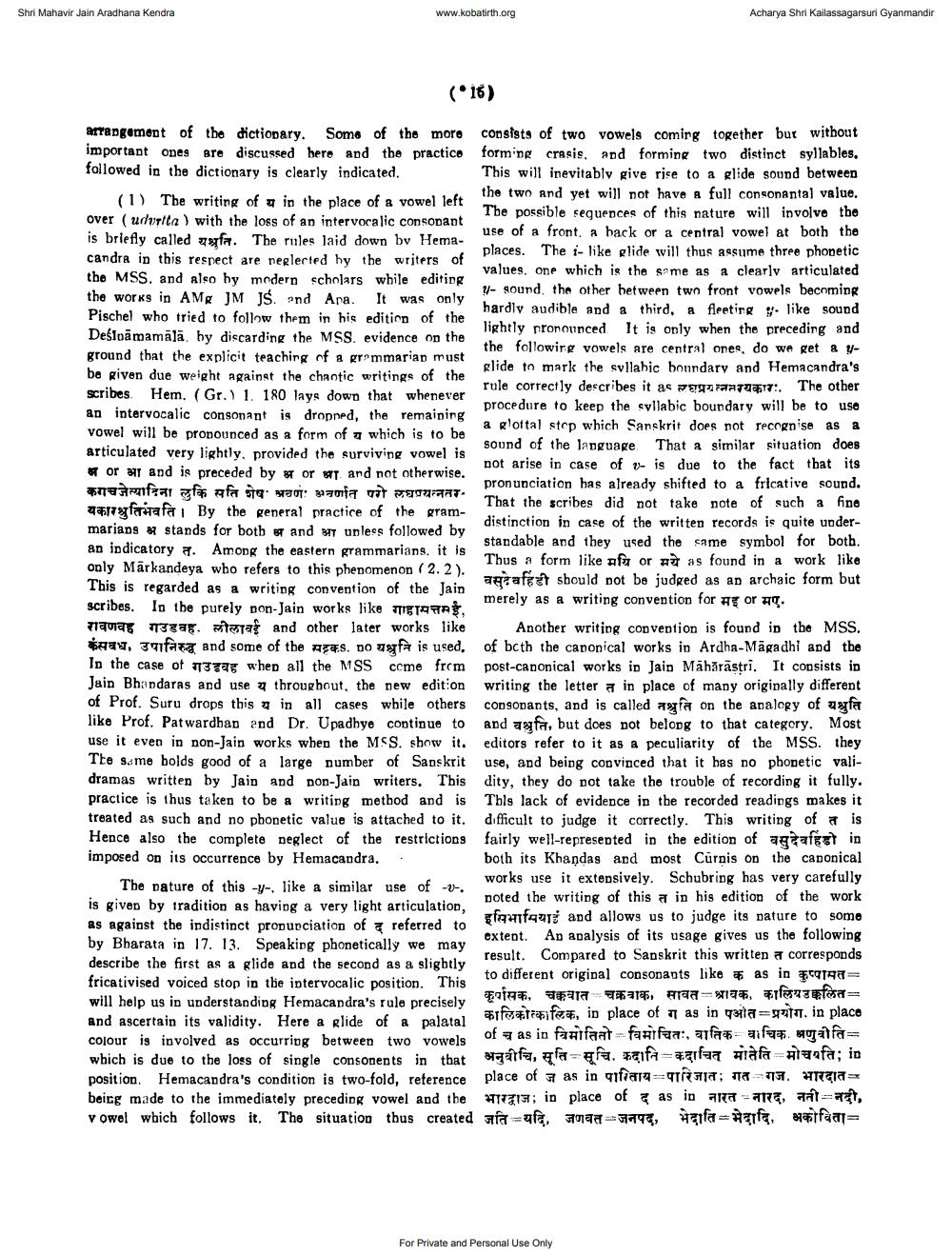________________
Shri Mahavir Jain Aradhana Kendra
www.kobatirth.org
Acharya Shri Kailassagarsuri Gyanmandir
(16)
arrangement of the dictionary. Some of the more consists of two vowels coming together but without important ones are discussed here and the practico forming crasis, and forming two distinct syllables, followed in the dictionary is clearly indicated.
This will inevitably give rise to a glide sound between (1) The writing of g in the place of a vowel left
the two and yet will not have a full consonantal value.
The possible sequences of this nature will involve the over (udurita) with the loss of an intervocalic consonant
use of a front a back or a central vowel at both the is briefly called fa. The rules laid down by Hema
places. The i-like glide will thus assume three phonetic candra in this respect are neglected hy the writers of the MSS. and also hy modern scholars while editing
values, one which is the same as a clearly articulated the works in AMG JM JS
1- sound, the other between two front vowels becoming and Apa. It was only Pischel who tried to follow them in his edition of the
hardly audible and a third, a fleeting y like sound Desioamamālā, hy discarding the MSS. evidence on the
lightly pronounced. It is only when the preceding and ground that the explicit teaching of a grommariap must
the following vowels are central ones, do we get & y
glide to mark the syllabic boundary and Hemacandra's be given due weight against the chaotic writings of the scribes. Hem. (Gr.) 1. 180 lays down that whenever
rule correctly describes it as gofaatua:. The other
procedure to keep the syllabic boundary will be to use an intervocalic consonant is dropped, the remaining vowel will be pronounced as a form of a which is to be
a glottal stop which Sanskrit does not recognise as a
sound of the language that a similar situation does articulated very lightly, provided the surviving vowel is
not arise in case of 1- is due to the fact that its 8 or at and is preceded by or at and not otherwise. # nftar gra afasta wadi
pronunciation has already shifted to a fricative sound. ama wat aaT.
That the scribes did not take note of such a fine 4377fartafa By the general practice of the gram
distinction in case of the written records is quite undermariang # stands for both ep and si unless followed by an indicatory
standable and they used the same symbol for both. . Among the eastern grammarians, it is only Märkandeya who refers to this phenomenon (2.2).
Thus a form like afort or at as found in a work like
agafat should not be judged as an archaic form but This is regarded as a writing convention of the Jain scribes. In the purely non-Jain works like TEATAS.
merely as a writing convention for मइ or मए. रावणवह गउडवह. लीलावई and other later works like Another writing convention is found in the MSS. कंसवध, उपानिरुद्ध and some of the सड़कs. no यश्रति is used. of both the canonical works in Ardha-Māgadhi and the In the case of 13798 whep all the MSS come from post-canonical works in Jain Mähärastri. It consists in Jain Bhandaras and use throughout, the new edition writing the letter in place of many originally different of Prof. Suru drops this in all cases while others consonants, and is called afa on the analogy of ayfa like Prof. Patwardhan and Dr. Upadhye continue to and agfa, but does not belong to that category. Most use it even in non-Jain works when the MSS. show it. editors refer to it as a peculiarity of the MSS. they The same bolds good of a large number of Sanskrit use, and being convinced that it has no phonetic validramas written by Jain and non-Jain writers. This dity, they do not take the trouble of recording it fully. practice is thus taken to be a writing method and is Thls lack of evidence in the recorded readings makes it treated as such and no phonetic value is attached to it. difficult to judge it correctly. This writing of a is Hence also the complete neglect of the restrictions fairly well-represented in the edition of aggafest in imposed on its occurrence by Hemacandra..
both its Khandas and most Curnis on the caponical
works use it extensively. Schubring has very carefully The nature of this -y-like a similar use of -v-.
noted the writing of this a in his edition of the work is given by tradition as having a very light articulation,
fanfaati and allows us to judge its nature to somo as against the indistinct propunciation of referred to
extent. An analysis of its usage gives us the following by Bharata in 17. 13. Speaking phonetically we may
result. Compared to Sanskrit this written a corresponds describe the first as a glide and the second as a slightly
to different original consonants like # as in a fricativised voiced stop in the intervocalic position. This will help us in understanding Hemacandra's rule precisely
14. a 14. praa-*17*, #feuzefesa= and ascertain its validity. Here a glide of a palatal
f aiza, in place of 7 as in ita=971. in place colour is involved as occurring between two vowels
wale of as in faalfaat- fagfaa, alas-128 wafa= as in
nita=a which is due to the loss of single consonents in that sairaalaa
at nafa f a; in position. Hemacandra's condition is two-fold, reterence place of as in affiang a ja; ta 737. ITEIT being made to the immediately preceding vowel and the 177157; in place of as in araang, atract, vowel which follows it. The situation thus created afarafa. ga , a= fa, fan=
For Private and Personal Use Only




